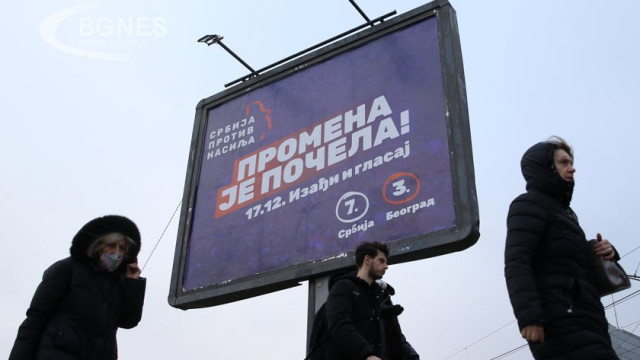Today, Serbs go to the polls in which the ruling party of populist President Aleksandar Vucic is likely to extend his rule after the security forces in Belgrade promised stability and threatened to curb inflation after months of protests.
Although Vucic will not take part in the parliamentary and local elections, the vote will still be seen largely as a referendum on his government, writes AFP.
Vucic's right-wing populist Serbian Progressive Party (SPP) has a double-digit lead over the leading opposition coalition, according to the latest Ipsos poll.
But the SPP faces tough municipal elections in the capital Belgrade, especially from the loose coalition of opposition parties and candidates running under the name Serbia Against Violence.
The movement was created after the mass shootings earlier this year that sent hundreds of thousands of people into the streets.
The rallies quickly turned into anti-government protests that lasted for months.
Vucic has repeatedly dismissed his critics and the protests as a "foreign conspiracy", warning that Serbia will remain directionless without his leadership.
"It's not about me leaving power, it's about them destroying everything. It will take us 20 years to fix everything... That's why we will defeat them more convincingly than ever before," he told supporters at a recent rally.
Vucic was omnipresent in the run-up to the vote, his image on billboards and buildings, while being the focus of news channel reports.
Like many other countries around the world, Serbia is plagued by double-digit inflation.
To blunt the hard edges of rising prices ahead of the election, Vucic began spending public funds -- increasing pensions and handing out money to the elderly.
The president promised to double average monthly wages in the coming years, while also increasing pensions.
Vucic has used his more than a decade in power to consolidate his grip on the levers of power, including de facto control of the media.
The president called snap elections in November, the latest example of how governments under his rule rarely last out of office - a move critics say is aimed at "holding back" the opposition.
The contest comes less than two years after the last round of presidential and parliamentary elections in which Vucic and the SPP strengthened their grip on power. /BGNES
The campaign was marked by the president's camp's control of the media — according to several studies, the president alone takes up 40 percent of the air time devoted to news. A figure that rises to 70% if we add news that mentions his party or Prime Minister Ana Brnabic.
The campaign was marked by the return to politics of ultra-nationalist figures from the past, including Vojislav Seselj.
The man who was Aleksandar Vucic's political mentor when he was still a member of the Serbian Radical Party (SRP) has been convicted of crimes against humanity by international justice.
Today he is an ally of the SPP for the local elections in Belgrade.
The grandson of Slobodan Milosevic - Marko, a member of the SRP, is third on the list.
The opposition pointed to risks of irregularities or fraud, while an investigation published days before the election accused the ruling party of vote-buying by offering call center workers triple their salary on election day if they produced proof of their vote in favor of the party of Vucic.
Opposition parties, subject to daily attacks by the ruling majority or the media that support it, however, rely on the support of a movement initiated by several intellectuals and popular figures called "ProGlass". Its promoters traveled the country to call for a vote "for change".
"All of Serbia has the same dream and I have come to convey it to you. This dream is to re-appropriate the state, to re-appropriate the institutions. This dream is to once again be the country of smiling people and once and for all to become again a country that will be led by the best among us and not by the worst," Judge Miodrag Majić, one of the founders of ProGlass.
Yet recent polls predict a SPP majority of between 40% and 45% of the vote. /BGNES







